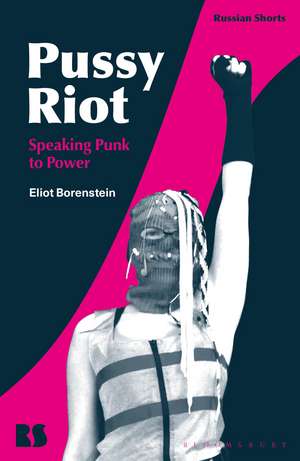Pussy Riot: Speaking Punk to Power: Russian Shorts
Autor Professor Eliot Borensteinen Limba Engleză Paperback – 11 noi 2020
| Toate formatele și edițiile | Preț | Express |
|---|---|---|
| Paperback (1) | 92.64 lei 6-8 săpt. | +15.56 lei 4-10 zile |
| Bloomsbury Publishing – 11 noi 2020 | 92.64 lei 6-8 săpt. | +15.56 lei 4-10 zile |
| Hardback (1) | 342.46 lei 6-8 săpt. | |
| Bloomsbury Publishing – 11 noi 2020 | 342.46 lei 6-8 săpt. |
Preț: 92.64 lei
Preț vechi: 100.87 lei
-8% Nou
Puncte Express: 139
Preț estimativ în valută:
17.73€ • 19.27$ • 14.90£
17.73€ • 19.27$ • 14.90£
Carte tipărită la comandă
Livrare economică 21 aprilie-05 mai
Livrare express 14-20 martie pentru 25.55 lei
Preluare comenzi: 021 569.72.76
Specificații
ISBN-13: 9781350113534
ISBN-10: 1350113530
Pagini: 152
Dimensiuni: 129 x 198 x 15 mm
Greutate: 0.18 kg
Editura: Bloomsbury Publishing
Colecția Bloomsbury Academic
Seria Russian Shorts
Locul publicării:London, United Kingdom
ISBN-10: 1350113530
Pagini: 152
Dimensiuni: 129 x 198 x 15 mm
Greutate: 0.18 kg
Editura: Bloomsbury Publishing
Colecția Bloomsbury Academic
Seria Russian Shorts
Locul publicării:London, United Kingdom
Caracteristici
Fuses together ideas about culture, performance, feminism, and political activism
Notă biografică
Eliot Borenstein is Professor of Russian & Slavic Studies, Collegiate Professor in the Faculty of Arts and Sciences, and Senior Academic Convenor for the Global Network at New York University, USA. His first book, Men without Women: Masculinity and Revolution in Russian Fiction, 1917-1919, won the AATSEEL award for best work in literary scholarship in 2000. In 2007, he published Overkill: Sex and Violence in Contemporary Russian Popular Culture, which received the AWSS award for best book in Slavic Gender Studies in 2008. His latest book, Plots against Russia: Conspiracy and Fantasy after Socialism, came out in 2019 and received the Wayne S. Vucinich Book Prize in 2020. Borenstein was also the recipient of a Guggenheim Fellowship in 2009.
Cuprins
List of ImagesIntroduction: Foolish Inconsistency1. Penis Riot: Pussy Riot's Pre-Feminist Roots2. Inciting a Pussy Riot3. When is a Church not a Church?4. Like a (Punk) Prayer5. Hurting Believers' Feelings6. Pussy Riot and Political Speech7. Performance vs. Archive8. Feminism and Other Dirty Words9. Anonymity and Glamour: Does the Camera Love Pussy Riot?Conclusion
Recenzii
In just over a hundred sparkling and witty pages, [Borenstein] takes readers inside the remarkable evolution of Pussy Riot... Along the way, Pussy Riot offers crisp insights into Russian feminism, performance art in the media age and the problem of anonymity in a world in thrall to celebrity.
This is recommended reading for anyone interested in history, feminism, politics and art movements.
Eliot Borenstein takes readers trough the fascinating discussion triggered by the Pussy Riot in and after their famous 'punk prayer'. Does contemporary protest have to be spectacular? What happens when protesters become celebrities? How feminist Pussy Riot eventually are? And what lessons can we learn from 'speaking punk to power'? A must read for everyone interested in art and politics.
Eliot Borenstein succinctly explains what made Pussy Riot a global phenomenon. He uncovers the complex context of the affair which builds off the interplay between political protest, prank and parody, language taboos, post-modernist art activism, performance, dissidence, punk, the subversive politics of the female body, religion, and church.
Borenstein shows the need to understand Pussy Riot not just as activists, but transgressive actionists, who played with meaning, context, and syntax to say no to the Putin regime's authoritarian performance. Unmasking the layers of meaning, the book takes the analysis through their improvisational, multivocal, and sometimes problematic transformation and ends with its own radical claim that Masha and Nadya continue to speak punk to power.
Unlike other accounts that have tried to unmask Pussy Riot, Eliot Borenstein sets a radically different agenda. Comfortable with the complexities and inconsistencies of the Pussy Riot phenomenon, he evaluates what it takes to fight the oppressive political regime in Russia. Borenstein's unique blend of wit, compassion and critical analysis makes this a highly engaging and enjoyable read.
This is recommended reading for anyone interested in history, feminism, politics and art movements.
Eliot Borenstein takes readers trough the fascinating discussion triggered by the Pussy Riot in and after their famous 'punk prayer'. Does contemporary protest have to be spectacular? What happens when protesters become celebrities? How feminist Pussy Riot eventually are? And what lessons can we learn from 'speaking punk to power'? A must read for everyone interested in art and politics.
Eliot Borenstein succinctly explains what made Pussy Riot a global phenomenon. He uncovers the complex context of the affair which builds off the interplay between political protest, prank and parody, language taboos, post-modernist art activism, performance, dissidence, punk, the subversive politics of the female body, religion, and church.
Borenstein shows the need to understand Pussy Riot not just as activists, but transgressive actionists, who played with meaning, context, and syntax to say no to the Putin regime's authoritarian performance. Unmasking the layers of meaning, the book takes the analysis through their improvisational, multivocal, and sometimes problematic transformation and ends with its own radical claim that Masha and Nadya continue to speak punk to power.
Unlike other accounts that have tried to unmask Pussy Riot, Eliot Borenstein sets a radically different agenda. Comfortable with the complexities and inconsistencies of the Pussy Riot phenomenon, he evaluates what it takes to fight the oppressive political regime in Russia. Borenstein's unique blend of wit, compassion and critical analysis makes this a highly engaging and enjoyable read.















